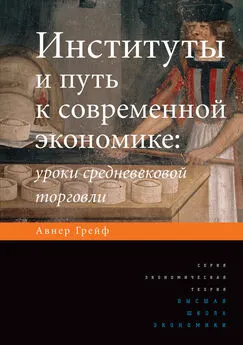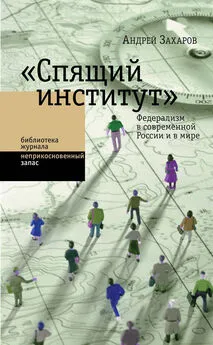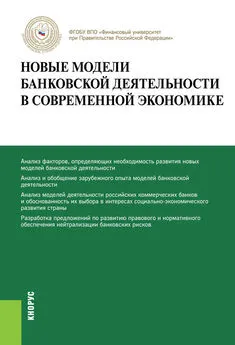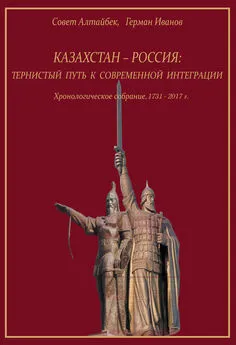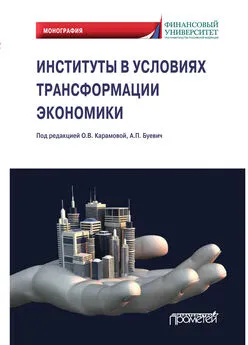Авнер Грейф - Институты и путь к современной экономике. Уроки средневековой торговли
- Название:Институты и путь к современной экономике. Уроки средневековой торговли
- Автор:
- Жанр:
- Издательство:Литагент «Высшая школа экономики»1397944e-cf23-11e0-9959-47117d41cf4b
- Год:2013
- Город:Москва
- ISBN:978-5-7598-0813-8
- Рейтинг:
- Избранное:Добавить в избранное
-
Отзывы:
-
Ваша оценка:
Авнер Грейф - Институты и путь к современной экономике. Уроки средневековой торговли краткое содержание
Принято считать, что существующие различия в экономике, политике и обществе отражают влияние различных институтов. Но среди экономистов, политологов и социологов нет единого мнения о том, что представляют собой институты, какие силы влияют на их сохранение и изменение и как мы можем повлиять на институциональное развитие. Эта междисциплинарная книга предлагает понятие институтов, которое объединяет внешне противоположные направления институционального анализа в социальных науках. В ней используется единый подход к изучению происхождения и сохранения институтов, их изменения и влияния предшествующих институтов на последующие.
Достоинства этого подхода демонстрируются при помощи сравнительных исследований институтов в средневековом европейском и мусульманском мире. Этот сравнительный анализ институциональных оснований рынков и государств и их динамики также способствует пониманию функционирования современных экономик. Он показывает своеобразие европейских институтов и объясняет, как и почему они привели к возникновению современной экономики, поддерживая обезличенный обмен, эффективные государства и использование знаний.
Институты и путь к современной экономике. Уроки средневековой торговли - читать онлайн бесплатно ознакомительный отрывок
Интервал:
Закладка:
Норт Д. Понимание процесса экономических изменений. М.: Изд. дом ГУ ВШЭ, 2010.
Олсон М. Возвышение и упадок народов. Экономический рост, стагфляция, социальный склероз. Новосибирск: ЭКОР, 1998.
Олсон М. Диктатура, демократия и развитие // Экономическая политика. 2010. № 1. С. 167–183.
Парсонс Т. Пролегомены к теории социальных институтов // Глобализация и социальные институты: социологический подход. М.: Наука, 2010.
Патнэм Р. Чтобы демократия сработала. М.: Ad Marginem, 1996.
Пшеворский А. Демократия и рынок. Политические и экономические реформы в Восточной Европе и Латинской Америке. М.: РОССПЭН, 2000.
Тилли Ч. Принуждение, капитал и европейские государства. 1990–1992 гг. М.: Территория будущего, 2009.
Уильямсон О. Экономические институты капитализма. СПб.: Лениздат, 1996.
Фукуяма Ф. Доверие. М.: АСТ, 2004.
Хайек Ф.А. Право, законодательство и свобода. М.: ИРИСЭН, 2006.
Хайек Ф.А. Экономическая теория и знание // Хайек Ф.А. Индивидуализм и экономический порядок. Челябинск: Социум, 2011. С. 41–68.
Хикс Дж. Теория экономической истории. М.: НП «Журнал вопросы экономики», 2003.
Шеллинг Т. Стратегия конфликта. М.: ИРИСЭН, 2007.
Эггертссон Т. Экономическое поведение и институты. М.: Дело, 2001.
Эльстер Ю. Социальные нормы и экономическая теория // THESIS: теория и история экономических и социальных институтов и систем. 1993. № 3. С. 73–91.
AbercrombieN., Hill S., TurnerB.S. The Dictionary of Sociology. 3rd ed. L.: Penguin Group. 1994.
Abou El Fadl K. Rebellion and Violence in Islamic Law. Cambridge: Cambridge University Press, 2001.
Abramovitz M. Catching Up, Forging Ahead, and Falling Behind // Journal of Economic History. 1986. Vol. 46. No. 2. P. 385–406.
Abreu D. On the Theory of Infinitely Repeated Games with Discounting // Econometrica. 1988. Vol. 56. P. 383–396.
Abreu D., Milgrom P.R., Pearce D.G. Information and Timing in Repeated Partnerships // Econometrica. 1991. Vol. 59. No. 6. P 1713–1733.
Abreu D., Pearce D.G., Stacchetti E. Optimal Cartel Equilibria with Imperfect Monitoring // Journal of Economic Theory. 1986. Vol. 39 (June). P 251–269.
Abulafia D. The Two Italies. Cambridge: Cambridge University Press, 1977.
Abulafia D. Catalan Merchants and the Western Mediterranean, 1236–1300: Studies in the Notarial Acts of Barcelona and Sicily // Viator. 1985. Vol. 16. P 209–242.
Abu-Lughod J. Before European Hegemony: The World System, A.D. 1250–1350. Oxford: Oxford University Press, 1991.
Acemoglu D., Johnson S., Robinson J.A. The Colonial Origins of Comparative Development: An Empirical Investigation // American Economic Review. 2001. Vol. 91 (Dec.). P. 1369–1401.
Acemoglu D., Johnson S., Robinson J.A. The Rise of Europe: Atlantic Trade, Institutional Change and Economic Growth: Memo. MIT, 2002.
Acemoglu D., Robinson J.A. Political Losers as a Barrier to Economic Development // AEA Papers and Proceedings. 2000. Vol. 90. P. 126–130.
Airaldi G. Groping in the Dark: The Emergence of Genoa in the Early Middle Ages // Miscellanea di Studi Storia. 1983. Vol. 2. P. 7–17.
Airaldi G. Genova e la Liguria nel Medioevo. Turin: Utet Libreria, 1986.
Akerlof G.A. An Economic Theorist’s Book of Tales. Cambridge: Cambridge University Press, 1986.
Akerlof G.A., Kranton R.E. Economics and Identity // Quarterly Journal of Economics. 2000. Vol. 115. No. 3. P. 715–753.
Akerlof G.A., Yellen J.L. Efficiency Wage Models of the Labor Market. Cambridge: Cambridge University Press, 1986.
AlSayyad N. Cities and Caliphs: On the Genesis of Arab Muslim Urbanism. N.Y.: Greenwood, 1991.
Andreoni J., Miller J. Giving According to GARP: An Experimental Test of the Consistency of Preferences for Altruism // Econometrica. 2002. Vol. 70. No. 2. P. 737–753.
Andreoni J., Miller J. Annali Genovesi di Caffaro e dei suoi Continuatori. 10991240 / transl. Ceccardo Roccatagliata Ceccardi and Giovanni Monleone. 4 vols. Genoa: Municipio di Genova, 1923–1929.
Annen K. Social Capital, Inclusive Networks, and Economic Performance // Journal of Economic Behavior and Organization. 2003. Vol. 50. No. 4. P. 449–463.
Aoki M. The Contingent Governance of Teams: Analysis of Institutional Complementarity // International Economic Review. 1994. Vol. 35. No. 3. P. 657–676.
Aoki M. Toward a Comparative Institutional Analysis. Cambridge, MA: MIT Press, 2001.
Arias G. I Trattati Commerciali della Repubblica Fiorentina. Florence: Successori le Monnier, 1901.
Aron J. Growth and Institutions: A Review of the Evidence // World Bank Research. 2000. Observer 15 (1). P. 99–135.
Arrow K.J. The Limits of Organization. N.Y.: Norton, 1974.
Arrow K.J. Optimal and Voluntary Income Redistribution / S. Rosenfield (ed.). Economic Welfare and the Economics of Soviet Socialism: Essays in Honor of Abram Bergson, Cambridge: Cambridge University Press, 1981. P. 267–288.
ArthurB. W. Self-Reinforcing Mechanisms in Economics / K.J. Arrow, P. Anderson (eds). The Economy as an Evolving Complex System. N.Y.: Wiley, 1988. P. 9–33.
Arthur B.W. Increasing Returns and Path Dependence in the Economy. Ann Arbor: University of Michigan Press, 1994.
Ashburner M., Walter A. The Rodian Sea-Law. Oxford: Clarendon Press, 1909.
Aumann R.J. Game Theory / J. Eatwell, M. Milgate, P. Newman (eds). The New Palgrave: A Dictionary of Economics. L.: Macmillan, 1987. No. 2. P. 460–482.
Aumann R.J., Brandenburger A. Epistemic Conditions for Nash Equilibrium // Econometrica. 1995. Vol. 65. No. 5. P. 1161–1180.
Aumann R.J., Hart S. (eds) Handbook of Game Theory with Economic Implications. Vols. 2, 3. North Holland: Elsevier Science Publishers, 1994, 2002.
Bairoch P., Batou J., Chevre P. (eds) The Population of European Cities from 800 to 1850. Geneva: Center of International Economic History, 1988.
Baliga S., Polak B. The Emergence and Persistence of the Anglo-Saxon and German Financial Systems // Review of Financial Studies. 2004. Vol. 17. No. 1. P. 129–163.
Ball R. Individualism, Collectivism, and Economic Development // Annals of the American Academy of Political and Social Science. 2001. No. 573 (Jan.). P. 57–84.
Ballard A., Tait J. (eds) British Borough Charters, 1042–1216. Cambridge: Cambridge University Press, 1913.
Ballard A., Tait J. (eds) British Borough Charters, 1216–1307. Cambridge: Cambridge University Press, 1923.
Bandura A. Social Learning Theory. Englewood Cliffs, NJ: Prentice-Hall, 1971.
Banerjee A.V., Newman A.F. Occupational Choice and the Process of Development // Journal of Political Economy. 1993. Vol. 101. No. 2. P. 274–298.
Banks J.S., Calvert R.L. Communication and Efficiency in Coordination Games // Working Paper. No. 196. Department of Political Science, University of Rochester,
1989.
Barbadoro B. Consigli della Reppublica Fiorentina. Bologna: R. Accademia dei Lincei, Forni Editore, 1921.
Bardhan P. Alternative Approaches to the Theory of Institutions in Economic Development // The Economic Theory of Agrarian Institutions/ Pranab Bardhan (ed.). Oxford: Clarendon Press, 1991. P. 3–17.
Barzel Y. Economic Analysis of Property Rights. Cambridge: Cambridge University Press, 1989.
Barzel Y. A Theory of the State. Cambridge: Cambridge University Press, 2002.
Bates R.H. Prosperity and Violence // The Political Economy of Development. N.Y.: Norton, 2001.
Bates R.H., De Figueiredo R.J.P., Weingast B.R. The Politics of Interpretation: Rationality, Culture, and Transition // Politics & Society. 1998. Vol. 26. No. 4. P. 603–642.
Bates R.H., Greif A., Levi M., Rosenthal J.-L., Weingast B. Analytic Narrative. Princeton, NJ: Princeton University Press, 1998.
Bates R.H., Greif A., Singh S. Organizing Violence // Journal of Conflict Resolution.
2002. Vol. 46. No. 5. P. 599–628.
Becker G.S. A Theory of Social Interactions // Journal of Political Economy. 1974. Vol. 82. P. 1963–1993.
Belgrano L.T. Tavole Genealogiche a Corredo della Illustrazione del Registro Arcivescovile de Genova. Genoa: Atti della Societ'a Ligure di Storia Patria, 1873.
Bellah R.N., Madsen R., Sullivan W.M. (eds) Habits of the Heart: Individualism and Commitment in American Life. Berkeley: University of California Press, 1985.
Bellamy J. Crime and the Courts in England, 1660–1800. Princeton, NJ: Princeton University Press, 1973.
Benabou R. Education, Income Distribution, and Growth: The Local Connection // Working Paper, Department of Economics, Massachusetts Institute of Technology, 1994.
Bendor J., Mookherjee D. Norms, Third-Party Sanctions, and Cooperation // Journal of Law, Economics, & Organization. 1990. Vol. 6. P 33–63.
Benjamin of Tudela. 1159–1173. Itinerary / transl. Michael Singer, Marcus N. Adler, A. Asher. Malibu, Calif.: Joseph Simon/Pangloss Press, 1987.
Ben-Ner A., Putterman L. (eds) Economics, Values and Organization. Cambridge: Cambridge University Press, 1998.
Benoit J.-P., Krishna V. Finitely Repeated Games // Econometrica. 1985. Vol. 53. No. 4. P 905–922.
Bensa E. The Early History of Bills of Lading. Genoa: Stabilimento D’arti Grafiche, 1925.
Ben-Sasson M. The Jews of Sicily, 825-1068 (in Hebrew and Judeo-Arabic). Jerusalem: Ben-Zevi Institute, 1991.
Benson B.L. The Spontaneous Evolution of Commercial Law // Southern Economic Journal. 1989. Vol. 55. No. 3. P 644–661.
Beresford M., FinbergH.P.R. English Medieval Boroughs: A Handlist. Newton Abbott: David and Charles, 1973.
Berger P.L. Invitation to Sociology. Harmondsworth: Penguin Books, 1977.
Berger P.L., Luckmann T. The Social Construction of Reality. N.Y.: Anchor Books, 1967.
Berkowitz D., Pistor K., Richard J.-F. Economic Development, Legality, and the Transplant Effect // European Economic Review. 2003. Vol. 47. No. 1. P 165–195.
Berman H.J. Law and Revolution: The Formation of the Western Legal Tradition. Cambridge, MA: Harvard University Press, 1983.
Bernheim B.D. Rationalizable Strategic Behavior // Econometrica. 1984. Vol. 52. No. 4. P 1007–1028.
Читать дальшеИнтервал:
Закладка:
